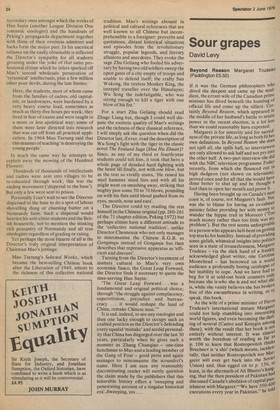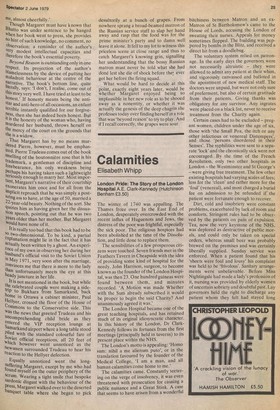Sour grapes
David Levy
Beyond Reason Margaret Trudeau (Paddington £5.50) If it was the German philosophers who dived the deepest and came up the muddiest, the errant wife of the Canadian prime minister has dived beneath the humbug of official life and come up the silliest. Certainly Beyond Reason, which appeared in the middle of her husband's battle to retain power in the recent election, is a lot less than we could reasonably have expected. Margaret is for sincerity and for sacredness of the private life, as long as both fit her own definitions. In Beyond Reason she does not spill all, she spills half, so interviewers are only allowed to ask half and not pry int° the other half. A two-part interview she did with the NBC television programme Today recently, from which she flounced out 10 high dudgeon (not shown on television), proved once and for all that she would have done better to shut up and be thought a fool than to open her mouth and prove it Having been brought up on Canada's we coast is, of course, not Margaret's fault. Not was she to blame for having an ex-cabinet minister father providing her with money to wander the hippie trail in Morocco ('r°° much money rather than too little was My problem'). But the rest seems unforgivable in a person who appears hell-bent on getting top marks for humility. Instead of providing some girlish, whimsical insights into politics seen in a state of trouserlessness, Margaret Trudeau — via the slick hand of a franklY acknowledged ghost writer, one Caroline Moorehead — has bestowed on a world audience a profoundly boring catalogue of her inability to cope. And we have had to beg for it at sold-out book counters only because she is who she is and not what she is, while she vainly believes she has broken free of this encumbrance in writing, so to speak, this book. As the wife of a prime minister of Pierre Trudeau's international stature Margaret could not help stumbling into interesting world figures, and even becoming the darling of several (Castro and Kosygin among these), with the result that her book is not entirely without interest. It was almost worth the boredom of reading as far as p. 108 to learn that Rostropovitch thinks Brezhnev is 'a shit' (which means, incidentally, that neither Rostropovitch nor Ma!: garet will ever get back into the Soviei Union) and, thus egged on to p. 156, t° learn, in the aftermath of Ali Bhutto's hang: ing, that the then president of Pakistan ha° discussed Canada's abolition of capital pull: islunent with Margaret:,,we have 350-40U executions every year in Pakistan," he told me, almost cheerfully.' Though Margaret must have known that Bhutto was under sentence to be hanged When her book went to press, she provides nn hint of such knowledge, no comment, no Observation, a reminder of the author's Very modest intellectual capacities and therefore the book's essential poverty.
Beyond Reason is outstanding only in one respect. Its projection of the author's blamelessness by the device of putting her Maladroit behaviour at the centre of the narrative. The book's bottom line, quite literally, says: 'I don't, I realise, come out of this story very well. I have tried at least to be honest.' If honesty means being the antistar and anti-hero of all occasions, an enfant terrible instantly qualified for our forgive 5S, then she has indeed been honest. But it is the honesty of the woman who, having Murdered her husband, throws herself on the mercy of the court on the grounds that She is a widow.
That Margaret has by no means murdered Pierre, however, must be emphasized. Pierre Trudeau comes out of the book smelling of the boutonniere rose that is his trademark, a gentleman of discipline and forebearance, his only weakness being Perhaps his having taken such a lightweight seriously enough to marry her. Most important, Margaret's narrative of their courtship exonerates him once and for all from the implicit reproach that he was simply a posturing ass to have, at the age of 50, married a 22-year-old beauty. Nothing of the sort. She cluotes him as having given her the dissuasion speech, pointing out that he was two Years older than her mother. But Margaret would have none of it.
It is really too bad that this book had to be so two-dimensional. To be kind, a partial explanation might lie in the fact that it has actuall y been written by a ghost. An experi ence of my own in observing her during her .nusband's official visit to the Soviet Union In May 1971, very soon after the marriage, convinces me that there is more to the lady than unfortunately meets the eye at this heady juncture in her life. It is not mentioned in the book, but while the celebrated couple were making a sidetrip to Bukhara from Samarkand, back home in Ottawa a cabinet minister, Paul 4ellyer, crossed the floor of the House of Commons to the Conservative side. This was the news that greeted Trudeau and his uncomprehending child bride as they entered the VIP reception lounge at Samarkand airport where a long table stood Piled with the standard colourful fare of Soviet official receptions, all 20 feet of Which however went unnoticed as the newsmen surrounded Trudeau to hear his reaction to the Hellyer defection.
Equally unnoticed went the longsuffering Margaret, except by me who had found myself on the outer periphery of the scrum. Wearing a tight smile that bespoke sardonic disgust with the behaviour of the Press, Margaret walked over to the deserted banquet table where she began to pick desultorily at a bunch of grapes. From nowhere sprang a broad-beamed matron of the Russian service staff to slap her hand away and rasp that the food was for the prime minister's party and to damn well leave it alone. It fell to my lot to witness this priceless scene at close range and thus to catch Margaret's knowing grin, signalling her understanding that the bossy Russian matron must never be told what she had done lest she die of shock before the! ever got her before the firing squad.
What would be hard to decide at this point, exactly eight years later, would be whether Margaret enjoyed being so implausible in her new role as to be shooed away as a nonentity, or whether it was actually the genesis of the deep chagrin she professes today over finding herself in a role that was 'beyond reason' to try to play. And if I recall correctly, the grapes were sour.







































 Previous page
Previous page